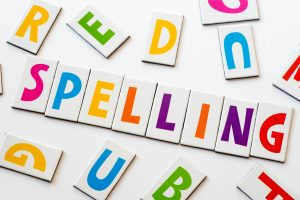 Over the course of 20 years of teaching, I think I hear the lament “Who made up all those words anyway?” at least once every year. It is a question voiced by students of all ages: from those in their first year of school through to older more experienced writers. And, if I’m truthful, I must admit I even silently ask myself this question from time to time.
Over the course of 20 years of teaching, I think I hear the lament “Who made up all those words anyway?” at least once every year. It is a question voiced by students of all ages: from those in their first year of school through to older more experienced writers. And, if I’m truthful, I must admit I even silently ask myself this question from time to time.
On the face of it, the question is about etymology: the study of the origins of words and how their meanings have changed throughout history. It is easy to take off in that direction when students ask.
Underneath the question is a carefully disguised wail about the challenge and seemingly insurmountable difficulty of mastering the spelling of English words. Of coming to terms with the multitude of ways that each of the more than 40 phonemes of English are represented in written English. After all how many people do you know that claim to be “good spellers”? Even among the teaching fraternity, not too many of us feel confident that we can accurately tackle all of the words we use at work.
So, how to respond to this important question? I have found that frank and open discussion about the history of our language is a good starting point. I talk to students about the many different languages that have contributed to the English language. I tell them about how when I was a young girl I had never heard of or eaten capsicum or a zucchini. (You should know that as I wrote those last four words I had to check the “um” in capsicum – my first try was the plausible but inaccurate “an”, but was happy about the “cch” in zucchini, even though “um” is a common English letter pattern and “cch” is not. Who invented all these words indeed!) The students laugh. They cannot imagine how I could not know about such common things.
I tell them about words that have been invented in my lifetime. Words that became necessary because of new technologies or changes in the world. Words that, when I was young, no one had yet imagined: Internet, mobile phone, video, compact disc, I-Pad, to name a few. They smile, their suspicion that I come from the ‘olden days’ confirmed. These words are commonplace to them and to me – now. It makes for an interesting discussion. And they begin to see the big picture – we have so many words because people keep inventing them. All kinds of people for all kinds of reasons.
I suggest words that have taken on new meanings. When I was younger, saying something was “bad” meant that it was – well – bad. Nowadays, it can be a compliment.
The students smile and nod. They are polite. But they are still puzzled. They want more and this is because what those inquisitive students are really asking is “How can anyone possibly expect me to learn to spell all of these tricky, amazing, diabolical, magical words that make English the astonishing and beautiful tool that it is?” And that is a totally different question.
There is only one answer. Not an easy answer and not a quick fix. We can all learn to spell better. All we have to do is to work at it, little by little, bit by bit over time; learn about where words come from; look for patterns; trust that it will get easier and clearer with time. Most importantly we need to be kind to ourselves and not expect to be experts straight away. And so in my classroom, we make learning about spelling an indispensable part of every day. It is purposeful and thoughtful. It grows organically from the reading and writing experiences we are having.
The Most Effective Way to Teach Spelling
- Talk about things that we notice when we read - that the “a” in “was” made an /o/ sound. We list other words where this happened (wand, wander, want, etc).
- Share things that we do to help us to get better at spelling.
- Build word lists and spelling strategy lists.
- Note interesting words in the books we read and celebrate how these words make the writing more interesting as well as taking a minute to think about any challenges in spelling these words.
- Learn to use our inner (and outer) ear to help us unpack words - sounding words out, e.g. f/i/sh, and writing one or more letters for each sound.
- Link words we know to words we are learning e.g. knows hot, uses this to write pot.
- See smaller words in a word, e.g. happy in unhappy.
- Learn about syllabification, e.g. go/ing - we know that every syllable has a vowel sound.
- Try writing words - seeing if they look right.
- Use memory devices (mnemonics) to remember the tricky parts of words, e.g. dessert contains “ss” because desserts are super sweet.
- Use resources, e.g. dictionaries, word lists, someone who knows.
- Mispronounce words, e.g. saying ant-i-que to remember antique.
- Emphasize an unstressed syllable, e.g. sep-a-rate for separate.
In short, we learn to be spellers. Bit by bit our spelling improves. And, in the end, perhaps we can thank those people, through the ages, who invented all of those astounding words that help us to so precisely and joyfully say what we want to. Jenny Feely.

